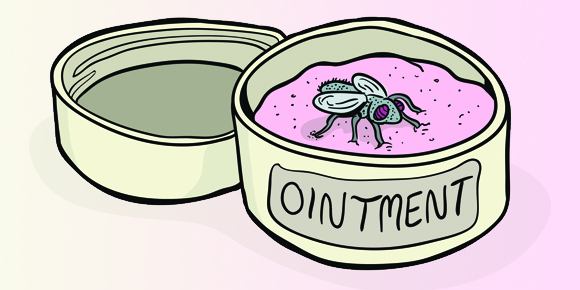Reptiles, insects and fish figure in many insults. Consider snake, louse, worm and shrimp.
The “deceitful serpent” goes back to Eve in the Garden of Eden. Ever since, snakes have depicted the ultimate in low-life — the traitor. Thus, we have snake-in-the-grass and snaky. As well, a rattlesnake is both dangerous and cunning.
Termite, a newish insult, was first used by Americans in Vietnam to dehumanize the “other side.”
An older insult is tick. The original Oxford Dictionary (1613) defined tick as, “term of contempt.” Today, tight as a tick still means “very drunk.” Ticky-tacky is “vulgar; corny.” A tick walking suggests someone seeking a prostitute.
About AD 900, doctors became known as leeches because they used leeches to suck blood from the sick in the belief they were drawing off the illness. From that ancient usage, we got leech denoting one who sucks away another’s money. Bloodsucker is a related term.
A bedbug in the 1920s was any unpleasant person. Bedbug Alley was the poorest part of town.
Since 1910, beetle has signified an eccentric person, while beetle-brain (1600s) and beetle-head (1500s) both mean, “fool.”
Throughout the 1900s, a cockroach was a “despicable person.” A cockroach business is still a “dubious enterprise,” while a filthy restaurant is a cockroach joint. Shortened to roach (1930s), it represented, “policeman.”
A contemptible person who feeds on others is a maggot. In U.S. college slang (1980s), maggot became, “a very lazy person.” To have maggots in one’s head, or, to be mad as a maggot, is to be “very crazy.”
Caterpillar in the 1500s meant, “ne’er-do-well who lives by his wits.” In 20th-century Australian slang, it became, “drunkard.”
Lousy and louse both mean, “contemptible.” A louse cage, in the late 1800s, was a cheap hotel — a flea bag or flea trap.
A moth is a prostitute.
When E.B. White wrote Charlotte’s Web (1952), many believed the spider’s reputation might be exonerated since Charlotte was a nice spider. It didn’t happen. Spiders are still abhorred and feared.
Since the 16th century, human spiders have been viewed as evil people intent on snaring victims. In Australian slang, spiders or rock spiders, are thieves who rob couples making love on beaches. And Shakespeare wrote, “Why strew’st thou sugar on that bottled spider/Whose deadly web ensnareth thee about?” (Richard III, 1592).
Fish also figure in insults — poor fish, odd fish, fishy, drink like a fish, to fish for compliments or information.
Human predators — swindlers — are sharks: card sharks, loan sharks and financial sharks.
Shark is unusual as an animal word. It referred to humans before it designated a fish. In English since 1569, it’s possibly from the German, Schurk (scoundrel). Meanings range from “pickpocket,” to, “parasite,” to, “sharp operator,” to, “second-hand car salesman.”
Another fishy insult is cod. In mid-16th century, cod’s head equalled, “dupe; fool.” Codswallop (1960s) still means, “rubbish; drivel.” Cod, itself, suggests, “a drunk; fool; fake.” The verb, to cod, means, “to cheat; to defraud.”
From the mid-1800s, Catholics have been called, mackerel-snappers as well as fish-eaters.
And so it goes.
Try not to be slippery as an eel.



